August 14, 2019
In 1862, toward the end of the Edo Period in Japan, Yukichi Fukuzawa and other members of the shogunate visited Egypt for the first time as part of a Japanese mission to the West. Since then, Egypt and Japan have nurtured deep ties in politics, economics, culture and other dimensions for more than 150 years.
One of JICA's projects that symbolizes this relationship of trust between the two countries is the introduction of elements of Japanese-style education in Egypt. Through the Egypt-Japan Education Partnership announced in 2016, JICA provides support to comprehensively introduce characteristics of Japanese-style education in Egypt, from early childhood to higher education.
JICA is also supporting the establishment of the Grand Egyptian Museum that is scheduled to open in 2020. This to drive the tourism industry-a key industry in Egypt-and to help develop human resources for its operation, as well as for conservation and restoration work.
JICA also hosts training programs in Egypt to boost the country's contribution to Africa and the Middle East. In the same way that Japanese instructors from fields like agriculture and healthcare have shared their technology and knowledge with the people of Egypt in the past, Egyptian instructors are now conducting training for the people of Africa and the Middle East with JICA's support.
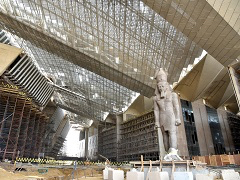
The Grand Egyptian Museum. Visitors are greeted by the statue of Rameses II at the entrance.
Stability and Growth in Egypt Essential to Development in the Region
Egypt is a large country with substantial influence on politics and diplomacy in the Middle East and North Africa. However, its per capita Gross National Income (GNI) is low at $3,410 compared to the average of $7,576 in the Middle East and North Africa.* With a population of 95.7 million people, which is the largest in the region, and a median age of 23.9 years, the country has potential for growth. Yet, the unemployment rate among 15- to 24-year-olds is 33.1%*.
JICA considers stability and growth in Egypt to be indispensable to the development of Africa and the Middle East and provides support in three focal areas, namely inclusive and sustainable growth, poverty reduction and enhancement of standards of living, and human resources development and improvement of public sector.
These three areas correspond with Japan's priority areas for support declared at the 6th Tokyo International Conference on African Development (TICAD VI) held in 2016: promoting structural economic transformation through economic diversification and industrialization; promoting resilient health systems for quality of life; and promoting social stability for shared prosperity.
- ※Data from the World Bank (2016)
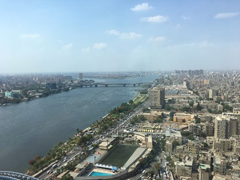
The capital city of Cairo located along the Nile River
Bringing Children up Healthily with Japanese-style Education
Japan and Egypt announced the Egypt-Japan Education Partnership in 2016, and JICA began to provide assistance in nurturing human resources that will support the development of Egypt by harnessing the characteristic features of Japanese education, comprehensively from early childhood to higher education.
Through this partnership, the Ministry of Education in Egypt opened in September 2018, 35 Egypt-Japan Schools that are model schools for primary education. The purpose of establishing these model schools is to improve the quality of education in Egypt, where primary schools tend to overemphasize the importance of academic achievement. We are introducing special activities known as Tokubetsukatsudo (Tokkatsu) that are practiced in Japanese elementary schools, such as class discussions, daily class leader (nitchoku) and classroom cleaning, under our Project for Creating Environment for Quality Learning. These activities help develop students' self-management skills, social skills and ability to cooperate with others. Japan Overseas Cooperation Volunteers with teaching experience also visit the schools and conduct model classes or advise the Egyptian teachers. The children seem to enjoy participating in the Tokkatsu activities.
These efforts have been praised by the children's guardians as well, with some saying that children have started cleaning and helping at home too. The Egyptian government plans to further expand such Japanese-style educational initiatives going forward, including the Egypt-Japan Schools. JICA, too, will continue to support the introduction of the Japanese-style educational model in the country.
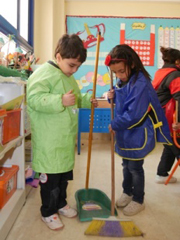
Students clean the classroom, just like in Japanese schools
Reviving the Tourism Industry by Constructing a New Museum and Developing Human Resources
Tourism is a key industry in Egypt and essential to the country's economic development. However, more than 100 years have passed since the Museum of Egyptian Antiquities, one of the main tourist attractions in Egypt, has opened. Therefore, the construction of a new museum, the Grand Egyptian Museum (GEM), was planned and is underway with the aim to make it one of the largest museums in the world. JICA is financing the construction. In preparation to the opening of the GEM, JICA has also been providing, since 2008, support for the development of human resources who can carry out the conservation and restoration of cultural assets as well as run the museum after it opens.
JICA is providing assistance in a wide range of areas, from the construction of a database of the GEM Conservation Center's collection, to the training of conservation and restoration professionals as well as museum operation staffs. Japanese experts with top-level skills and knowledge have led training programs in both Japan and Egypt, training and transferring their skills to Egyptian staffs. To date, a total of more than 2,000 local personnel have been trained through JICA's assistance.
Construction of the Grand Egyptian Museum is progressing, and it is scheduled to open in 2020. JICA will continuously work together with the Egyptian partners to prepare for the opening of a new symbol of Egyptian-Japanese Cooperation.
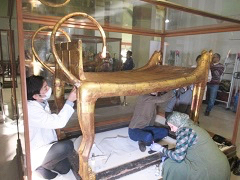
Japanese and Egyptian staff members work together to restore Tutankhamun's golden bed
Contributing to the Development of Africa and the Middle East through Training Programs in Egypt
JICA has been conducting the Third Country Training Programs in Egypt [1] for Africa and the Middle East. These training programs began in Egypt in 1985, long before the South-South Cooperation [2] became the main theme of 3rd Tokyo International Conference on African Development (TICAD III) held in 2003. Continuing to today, the program has so far trained about 6,000 people from Africa and the Middle East.
Training implementing organizations include institutions that received JICA's assistance in the past. Most of the instructors are Egyptians. These training programs are supported by JICA, meanwhile, it also supports the regional assistance of the Egyptian government to neighboring countries. Fifteen training programs were held in FY2018 for Africa and the Middle East.
One of the training programs for Africa focuses on rice cultivation techniques with the objective of using Egypt's advanced rice cultivation techniques to raise the level of rice production in Africa. Rwanda's Ladislas Hakizimana, Agricultural Extension Administrator, who took part in the training program in 2013, said that by sharing the technologies learned during the training program with farmers back home, they were able to increase production by 25%, from 4.5 tons to 5.6 tons, in the area under his charge.
JICA will continue to contribute to the development of Africa and the Middle East in cooperation with Egypt.
Notes
- [1] Training programs in which institutions in developing countries that received skills training from Japan in the past conduct training programs for other developing countries.
- [2] When a developing country with an advantage in a certain field provides supports for other developing countries to promote that field.
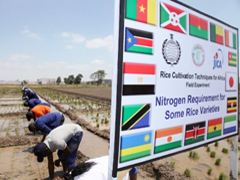
Practical training under the Rice Cultivation Techniques course for Africa




scroll